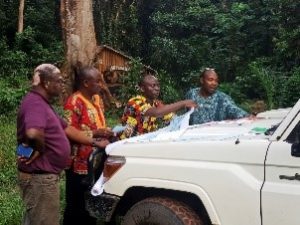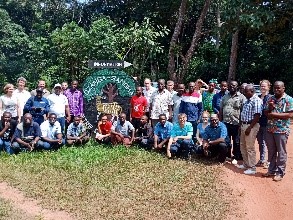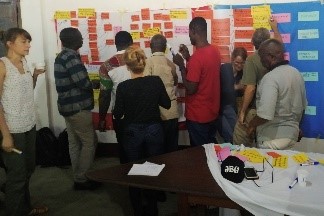Story from Anne Ntongho, CCNet Africa co-leader
In the Central African Republic, WWF has been supporting the Dzanga-Ndoki National Park with the state government since 1990. Because of the park’s location and many stakeholders, conservation must be inclusive. The park is located in the Dzanga-Sangha Special Dense Forest Reserve at the southwestern tip of the country, directly adjacent to Cameroon and the Republic of Congo. The park is part of the “Tri-national de la Sangha” transnational protected area, which is part of the Congo Basin rainforest–the second-largest contiguous tropical rainforest area in the world and a UNESCO World Heritage Site. A 500 square kilometer community hunting zone that runs between the national park and the reserve allows for traditional hunting, and within the reserve, limited use by the timber industry and agriculture is possible.
To ensure coherence between these different components, the Dzanga Sangha program began using the Cosnervationn Standards to redefine its objectives, improve strategies, increase efficiency, maintain interventions, enable better monitoring, and access sustainable sources of funding. In July 2019, 35 WWF staff, government representatives, local NGOs and other partners joined a workshop in Bayanga, CAR, to evaluate and revise the 2016-2020 management plan for the Dzanga Sangha protected areas. The workshop focused on adopting a new mode of management and new organizational charts, redefining priority strategies, and establishing approaches for evaluation and monitoring. Participants also worked on integrating the northern expansion of the protected area towards the Ngotto forest and better social safeguards for the different components of the program. The Dzanga Sangha team is highly motivated and participated enthusiastically during the workshop. Several invited partners also participated eagerly. The workshop showed that the Dzanga Sangha program has a diverse set of relatively well-established strategies. When it became evident that the strategies that are in practice do not work together in harmony to achieve joint objectives, the team produced a revised strategy. This was highly appreciated by many participants, as they learned more about what their colleagues were doing and how it could all contribute to shared objectives and goals.



Photo credits: WWF Cameroon (Anne Ntongho / Jaap Van der Waarde).
